Levent Kenez/Stockholm
Turkish Parliament Speaker Numan Kurtulmuş met with the head of the Israeli Knesset, Amir Ohana, last week during the European Conference of Presidents of Parliament in Dublin. The newly elected parliament speaker from Turkey’s Islamist ruling party, Kurtulmuş is known for his harsh rhetoric regarding Israel. He has previously described Israel as an occupying, killer and terrorist state while also asserting that Israel’s power stems from international Zionism.
The Ohana-Kurtulmuş meeting was initially featured as a standalone story on the official website of the Turkish Parliament, accompanied by a photograph of Kurtulmuş and Ohana shaking hands. The text was subsequently included in a report of Kurtulmuş’s meeting with Jerry Buttimer, the Irish Senate speaker. The state-run Anadolu news agency announced both meetings under the same headline but did not include any statements or details regarding the meeting with Ohana.
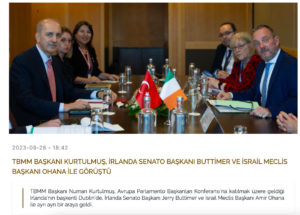
In a tweet on May 7, Kurtulmuş stated, “Once again, during the holy month of Ramadan, the besieged and blockaded Gaza becomes the target of Israel’s state terrorism, where a handful of oppressed Palestinians are bombed by Zionist killers, amid the tensions at Al-Aqsa Mosque.” Accusing the international community, especially the Islamic world, of remaining silent, Kurtulmuş had called for immediate action, saying, “Beyond condemnation, the terrorist state Israel must be stopped.” In contrast to times of previous tensions, the government had issued a more measured condemnation, using a cautious tone when addressing the same events.
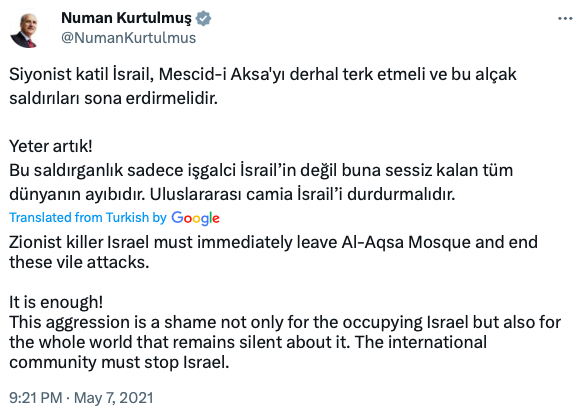
In another tweet after Kurtulmuş became parliament speaker in June, he strongly condemned “the heinous attack carried out by a group of fanatical Jewish occupiers against our holy scriptures” in the town of Urif in Palestine. This time, the term “Israeli authorities” is used, emphasizing that these authorities are obligated to prevent such deliberate attacks against the sacred values of Islam and bring the perpetrators to justice as soon as possible.
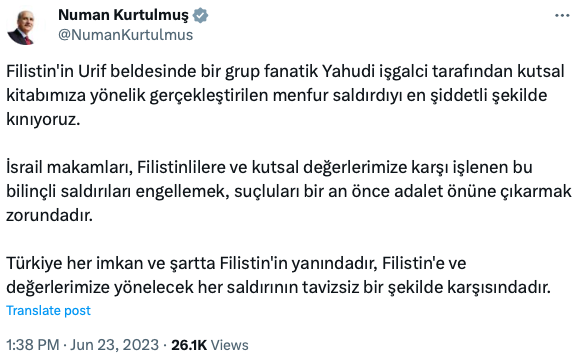
In addition to his social media posts, there is harsh criticism of Israel in Kurtulmuş’s speeches on various occasions.
Nordic Monitor previously reported that Kurtulmuş in 2020 during a video conference organized by the Önder Foundation, the oldest alumni association of religious imam-hatip schools in Turkey, said the conversion of Istanbul’s Hagia Sophia into a mosque was a dream come true for his generation, adding that freeing Jerusalem should be Turkey’s next responsibility
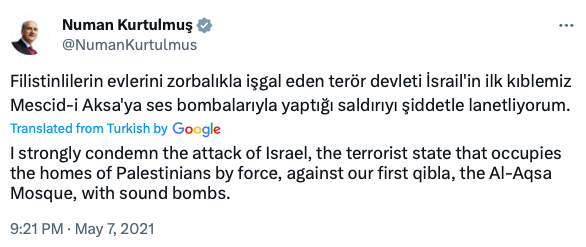
The meeting between the Turkish and Israeli parliament speakers can be seen as part of the government’s efforts to normalize relations with Israel. In 2021 a process of reconciliation between Turkey and Israel was initiated, gaining significant momentum with the visit of Israeli President Isaac Herzog to Ankara in March 2022. After that Turkey shifted away from its previously aggressive and accusatory language towards Israel as well as from its criticism of Israeli security operations in the Palestinian territories.
Last month Turkish President Recep Tayyip Erdogan met with Israeli Prime Minister Benjamin Netanyahu at the Turkish House in New York during the United Nations General Assembly, reaching an understanding to further enhance bilateral relations. It’s worth noting that, like Kurtulmuş, President Erdogan had previously used terms such as “killer,” “Zionist” and “occupier” when referring to Israel in the past.
Kurtulmuş, who comes from the Islamist National View (Milli Görüş) movement, made a significant political move by leaving the Virtue Party (Fazilet Partisi) and founding his own party. In 2002, following a split within the Virtue Party, Kurtulmuş established the People’s Voice Party (Halkın Sesi Partisi, or Has Party), positioning it as a conservative and democratic alternative.
During his tenure as Has Party leader, Kurtulmuş openly criticized the AKP government on various fronts. He voiced concerns about corruption, the concentration of power in the hands of the executive, the erosion of democratic institutions and limitations on freedom of speech. Kurtulmuş argued for a more inclusive and participatory political system that respected the rule of law and protected individual rights.
Kurtulmuş’s statement, “They came like Harun but turned into Karun,” referring to corruption allegations involving Erdogan’s party, has become popular in Turkish politics. In this context, “Harun” refers to the Prophet Aaron, symbolizing honesty and justice, while “Karun” refers to Qarun, symbolizing wealth and ambition according to traditional Islamic belief. Therefore, the expression implies that individuals or groups initially perceived as virtuous or well intentioned can succumb to greed and corruption over time. It has been widely used in Turkish politics to criticize those who have undergone a negative transformation, particularly in relation to allegations of corruption or abuse of power. His statement continues to be frequently used against Kurtulmuş by the opposition.
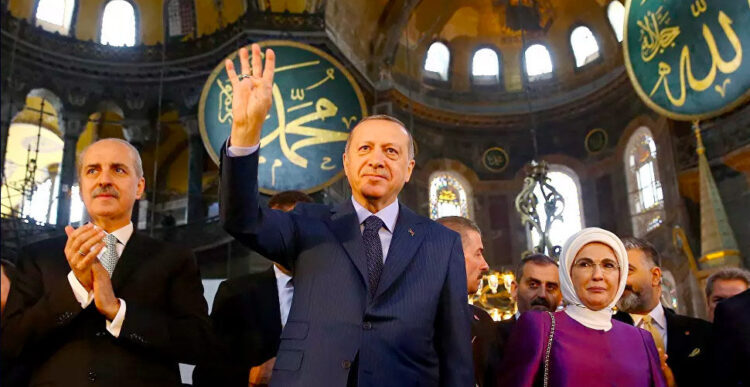
However, in a surprising move, Kurtulmuş made the decision to merge the Has Party with the AKP in 2012. This move raised eyebrows and led to questions about the credibility of his previous criticism. Some viewed the merger as a strategic move to maintain political relevance and secure a stronger position within the AKP, while others saw it as a compromise of his principles.
Following the integration of the Has Party in the AKP, Kurtulmuş’s criticism of the party seemed to fade into the background. His public statements became more aligned with the AKP’s official stance, prompting speculation that he had to conform to the party’s directives to maintain his position of influence.
Kurtulmuş has served in ministerial roles, including deputy prime minister (2014-2016) and minister of culture and tourism (2017-2018). His most recent position has been deputy chairman of the AKP since 2018.












